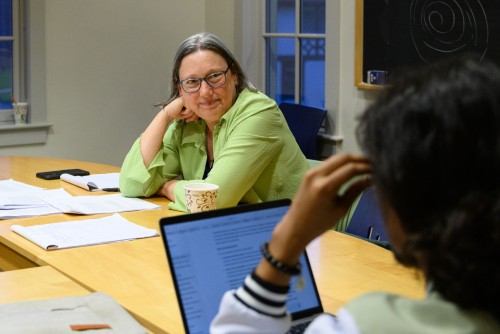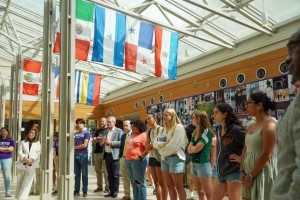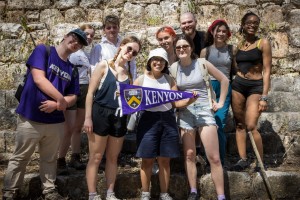Studying Latine Studies at Kenyon
Students in Kenyon’s Latine studies concentration learn from faculty experts in modern Mexican history, international development, postcolonial studies, literary translation, immigration and border studies, and transnational feminism. Coursework in American studies, art, English, history, political science, psychology, Spanish, sociology and gender & sexuality studies provides an interdisciplinary foundation for students to study, analyze, reconstruct and reflect on the Latine experience in the United States as well as its wider impact in the world.
Celebrating Hispanic Heritage
A flag ceremony highlighting Latin American countries in the atrium of Peirce Hall kicked off the campus community’s celebration of Hispanic Heritage Month. The annual celebration runs through Oct. 15, 2025.
Featured Courses
Latine Psychology
This course focuses on a vibrant and emerging field geared toward understanding the experiences of the largest minority group in the United States, either U.S.-born or U.S.-residing Latine. Learn about intracultural differences and similarities across Latine subgroups and how demographic and interpersonal variables operate in conjunction.
Latinx Literature and Film
How have Latinos and Latinas made sense of their experiences in the United States from the 16th century to today? This course takes an interdisciplinary approach that seeks to connect literature and film produced by and about U.S. Latinos and Latinas with the fields of history, political science, psychology, art and sociology.
Contemporary Latin American Politics
What are the successes and innovations, the problems and challenges for democracy in Latin America? Focusing on institutions, civil society and norms, we analyze contemporary Latin American democracies from the perspectives of representation, participation, legitimacy, accountability and the rule of law.
Transnational Social Movement
Do national borders still contain movements in any significant way? Is it true that globalization has generated new resources and strategic opportunities for the rise of transnational movements? This course examine recent protest movements that organize across borders.
Academic Explorations in Mexico
Over spring break, Assistant Professor of Anthropology and Latine Studies Tomás Gallareta Cervera and his students traded Gambier for the Yucatán to foster a more nuanced understanding of Latin American cultural heritage by examining the social structures that contributed to its development.


